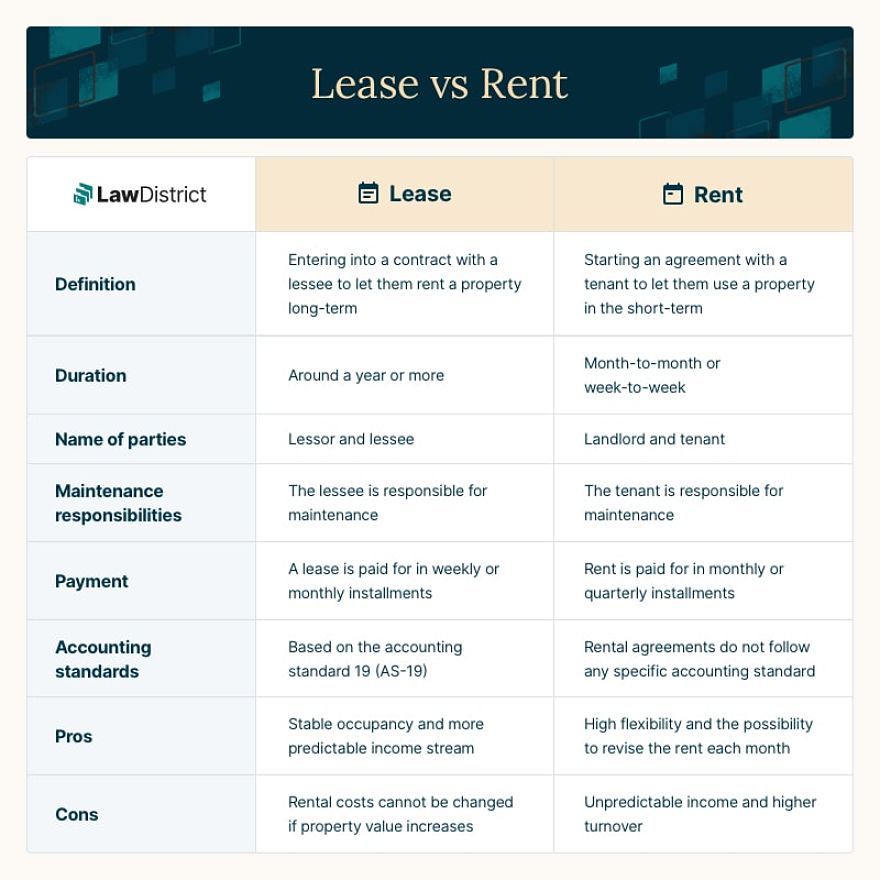When it comes to real estate the distinction between lease vs. rent can be an important one. Both have very similar meanings, yet, as is often the case with legal terms, the devil is in the detail as to which may suit your individual circumstances best.
To make the difference between lease and rent a little bit clearer, this article explains what landlords and tenants should know about these two distinctive terms. Read on to find out whether a rental or lease agreement is best for your circumstances and what you should consider before entering into either type of property contract.
What’s The Main Difference Between Leasing and Renting?
The key difference between a rental agreement and a lease is usually the amount of time it lasts for. However, both work very similarly in practice.
A rental agreement is usually more ad hoc and shorter-term, being continuously renewed on a week-by-week or month-by-month basis. On the other hand lease agreements often extend beyond a year in length and are much more binding in legal terms. There are some differences between month-to-month vs fixed-term leases.
What Does Lease Mean?
A real estate lease is defined as a contract between a landlord and a tenant that allows the tenant to take temporary ownership of a property. The legal contract between the two parties defines the use of the property and the length of time that the agreement will stand for.
Leases are normally longer in duration. They will last for at least 6 months and could extend for a number of years into the future. In some cases, the lessee may gain the opportunity to purchase the property, unlike a renter.
When a lease reaches its natural end, there is often a short notice period (around 30-90 days). This allows the two parties to reevaluate the terms of the contract before deciding to renew or end the agreement.
Nonetheless, leasing has a slightly different meaning when it comes to commercial real estate. In practice, a commercial property lease is almost the same as renting. However, despite the nature of the arrangement, commercial leases are very often long term agreements like most leases.
There is also a distinction between an all-inclusive commercial lease and a non-all-inclusive agreement. In the case of the former also includes the provision of services such as maintenance and insurance, whilst the latter only covers the cost of the unit rental.
What Does Rent Mean?
Renting - in real estate terms - is defined as making regular payments to make use of housing, an apartment, or another type of property. The terms and conditions of this arrangement between the landlord and tenant are usually (but not always) bound by a written rental agreement.
Rental agreements are normally designed for tenants who wish to have a flexible agreement with their landlord. This might be because they only need to rent a property for a temporary period of time, or they don’t need to make use of full possession of the property during their time using it.
This means that tenants won’t need to perform maintenance tasks on the home or building they are renting. This remains the responsibility of the owner, although the renter should ensure not to wilfully or needlessly damage the property or cause safety hazards.
Additionally, rental agreements can benefit landlords in a lot of situations. They allow them to keep their income in track with the housing market and react to any potential industry trends much more flexibly.
Of course, this offers less security to a certain degree for both the landlord and tenant as the terms of the rental agreement could potentially change at any time or a resident could leave. Each time a payment term ends (this might occur weekly or monthly), the contract could potentially be renegotiated or terminated.

Leasing or Renting a Property: Which is Better?
A few factors may come into consideration when deciding whether leasing or renting is better for your personal circumstances.
The most important of these is clearly defining how long you wish for the agreement to last. If you’re looking for long term stability, then a lease is probably your best choice. If you only need something short term and flexible then a rental agreement is best for your needs.
Remember, a lease is a binding contract and offers many more protections to landlords should a tenant break its terms. It also gives owners a lot more control over potential headaches such as preventing lessees allowing strangers to sublease the home or preventing incorrect use of the property.
Before entering into a lease or rental agreement, it’s very important to ensure that the contract is legally valid. It should always contain the terms and clauses that correctly follow state rental laws and allow both the landlord and the tenant to make the most practical use of the property.
LawDistrict allows you to quickly and easily prepare and print expert legal contract documents online. Optimize any agreement to fit your state’s laws with easy to follow instructions and guidelines.
Create your Lease Agreement now
Read more:
Landlords don'ts
[Sublet vs Sublease]https://www.lawdistrict.com/articles/sublet-vs-sublease-differences-and-advantages)



